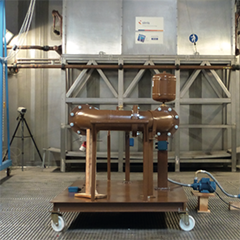The new trend in the installation of wind turbines is the choice of remote areas, where wind conditions are very often optimal leading to new investments for the implementation of wind energy parks. On the other hand, such locations have to deal with extreme inhospitable climatic conditions: extreme cold and/ or hot temperatures, strong winds and gusts, high humidity, ice and/or snow, salty environment (in the case of the offshore market). These harsh locations form a huge challenge for the machine itself and maintenance and repair work in such circumstances can be challenging. In some cases, repair work has to be postponed because of bad environmental conditions and thereby noticeably affects the turbine availability and its business case.
This is the reason why wind turbines and components need to be designed and validated as capable of surviving and operating in such extreme conditions. OEM’s and component suppliers are more and more aware of the need to perform advanced validation tests in order to substantiate confidence in its designs, and to increase the reliability and robustness of their products in such inhospitable environments.
EFAFLU is a Portuguese company entirely dedicated to the development, manufacture, marketing, technical support and after-sales service of pumps, pumping systems and fans. With the increase in the demand of wind turbine installation in harsh environments, EFAFLU saw the need to validate one of its leading product’s typology, oil pumps for transformers, performing cold start-up tests in extreme cold temperatures. For this, EFAFLU teamed up with Sirris/OWI-Lab.
Sirris/OWI-Lab is specialized in testing and verification of wind turbine components and full integrated systems, such as gearboxes, generators, liquid filled and cast resin transformers, power converters, hydraulic systems, etc. in extreme climatic conditions. This is thanks to its own climatic test chamber, one of the largest in Europe, which has a temperature range from -60°C to +60°C. A specific focus of the climatic test lab is in to test cold-start-up sequences, cold climate / winterization effects, and icing conditions on large electro-mechanical equipment.



























